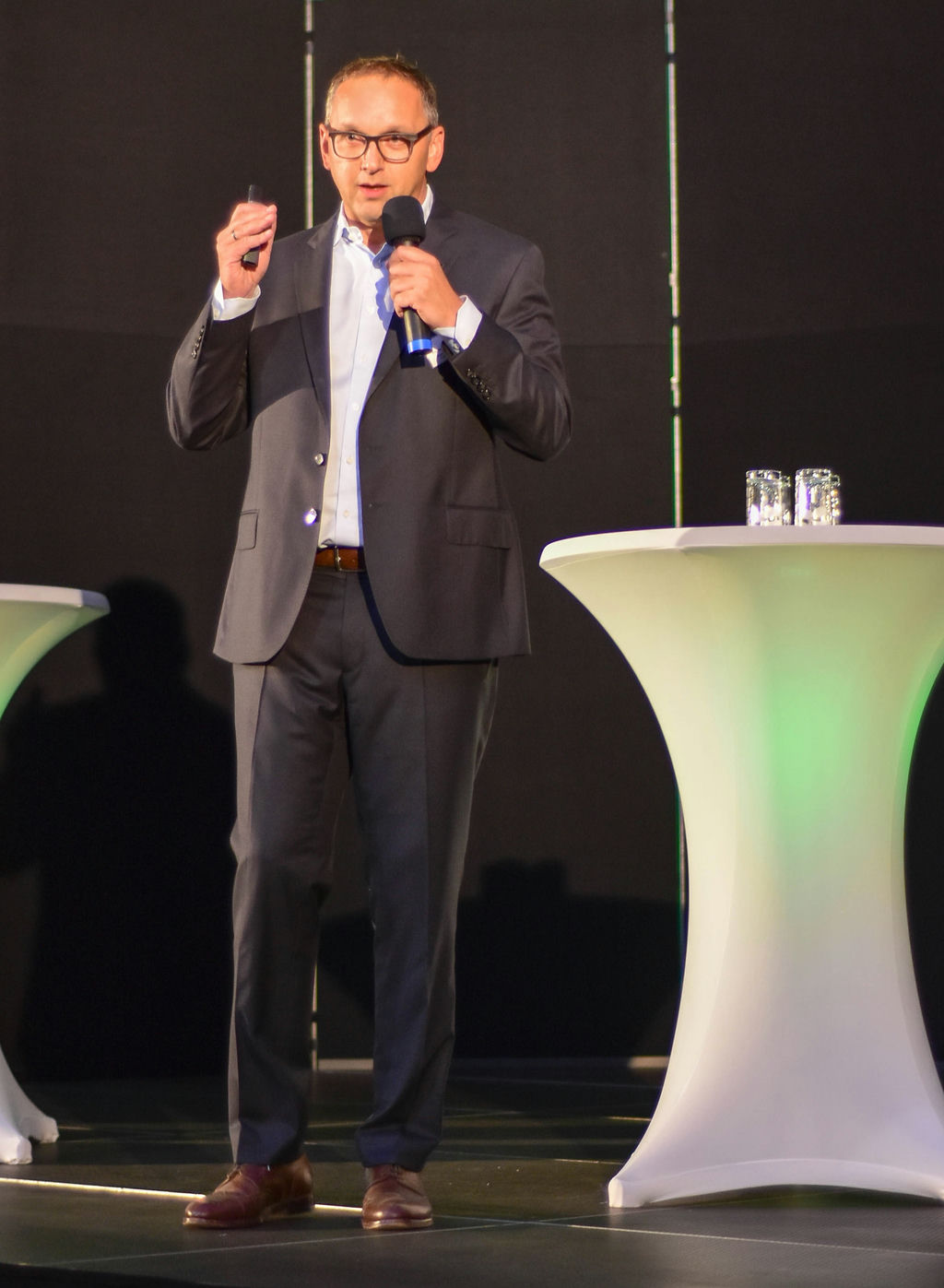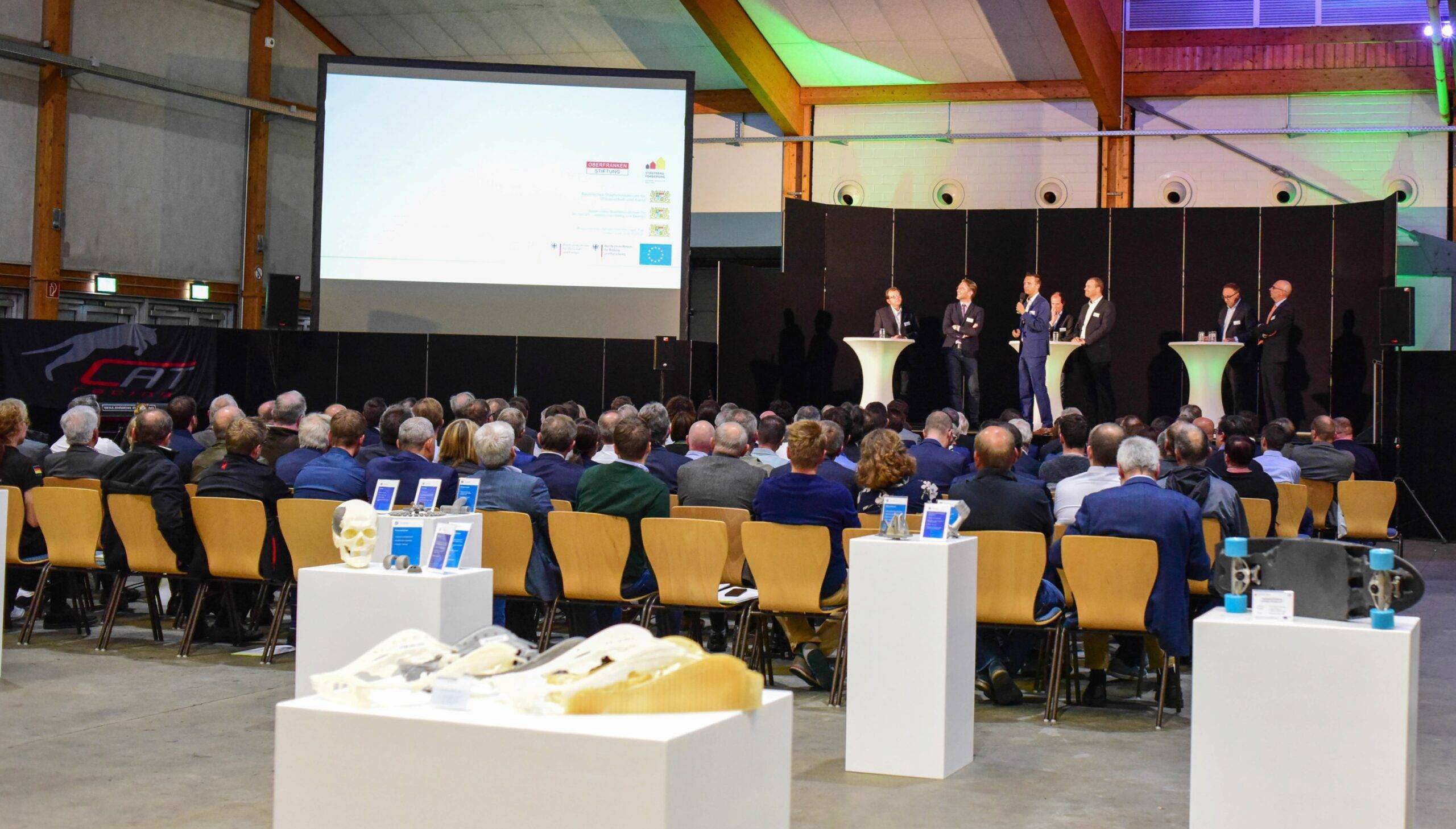At a promotional event on 26 September 2019 in Lichtenfels, the FADZ Research and Application Centre for Digital Future Technologies (Forschungs- und Anwendungszentrum für digitale Zukunftstechnologien) demonstrated its affirmation of the importance of basic and advanced vocational training for digital industrial strategies. Politicians of the region and from the Free State of Bavaria, representatives of the Coburg University, and entrepreneurs got together in Lichtenfels. Some 170 guests of the new FADZ met to discuss education and opportunities of digital transformation. Essential elements of the initiative are the new master’s programme “Additive Manufacturing and Lightweight Engineering” at the Coburg University of Applied Sciences and Arts in Lichtenfels, and the promotion of digital strategies of industry and trade in order to secure competitiveness. On the sidelines of this event we discussed the issue of the digital future with Frank Carsten Herzog, founder of Concept Laser GmbH in Lichtenfels and one of the pioneers of Metal Additive Manufacturing:
About Frank Carsten Herzog
 Frank Carsten Herzog studied Mechanical Engineering at the Coburg University of Applied Sciences and Arts and obtained the degree of Graduate Engineer (UAS) in 1999 with an award from the IHK Chamber of Commerce and Industry (Subject: “Introduction of New Sintering Technologies in the Rapid Tooling Process”). Based on his student research projects, Frank Carsten Herzog developed the LaserCUSING® technology, i.e., powder-bed based laser melting of metals, in 1997. He managed to file two basic patent applications for the laser melting method based on his diploma thesis, and established the company Concept Laser GmbH together with his wife in 2000.Between 2016 and 2019, Mr Herzog in his capacity as Managing Partner, CEO of Concept Laser and Member of the Advisory Board at GE Additive actively promoted the development of Concept Laser GmbH with its LaserCUSING® technology into a globally operating enterprise.
Frank Carsten Herzog studied Mechanical Engineering at the Coburg University of Applied Sciences and Arts and obtained the degree of Graduate Engineer (UAS) in 1999 with an award from the IHK Chamber of Commerce and Industry (Subject: “Introduction of New Sintering Technologies in the Rapid Tooling Process”). Based on his student research projects, Frank Carsten Herzog developed the LaserCUSING® technology, i.e., powder-bed based laser melting of metals, in 1997. He managed to file two basic patent applications for the laser melting method based on his diploma thesis, and established the company Concept Laser GmbH together with his wife in 2000.Between 2016 and 2019, Mr Herzog in his capacity as Managing Partner, CEO of Concept Laser and Member of the Advisory Board at GE Additive actively promoted the development of Concept Laser GmbH with its LaserCUSING® technology into a globally operating enterprise.
Indian 3D Printing Network: What does the FADZ stand for?
Frank Carsten Herzog: The intention of the FADZ Lichtenfels is to enable access to digital manufacturing technologies for medium-sized businesses and young people. This shall help to tackle the issue of manpower shortage, and to provide incentives for skilled specialists to stay in the region. In addition, it shall be a sign of high-tech orientation in rural areas. The region shall be understood as a “3D hotspot”.
I3DPn: The master’s programme “Additive Manufacturing and Lightweight Engineering” at the Coburg University of Applied Sciences and Arts in Lichtenfels is the major sign, isn’t it?
FCH: This is the first, concrete step. The FADZ’ general approach is distributing digital strategies across industries by means of basic and advanced vocational training and knowledge transfer. We also wish to develop new educational models. If we look at the presently available machines, processes and materials, we must admit there is a lot to choose from. Now it is high time to get people on board: by means of training and upskilling. Our enterprises and workforce will have to adapt themselves to an entirely new situation as a result of the digital revolution. I think we are currently in the middle of a fundamental change the way we had it back in the 19th century during the transition from manufactories to industrial enterprises. Digital industries create digital products and processes. What we need to do now is to prepare people for this new world, and to train them accordingly.
I3DPn: What does the digital transformation mean in the context of Industry 4.0?
FCH: If we put conventional manufacturing technologies under pressure with – let’s say – additive manufacturing or the like, medium-sized businesses will need assistance in this process of transformation. The basis for this shall be established by means of interlinking the know-how available from universities, institutes, enterprises and the workforce. Small enterprises and crafts are particularly in need of support. Industry 4.0 requires a lot of stimuli and good ideas.
I3DPn: Why Lichtenfels?
FCH: Concept Laser and our contribution to metal laser melting made it possible to show that innovation can just as well develop in rural areas. We have thus established the foundation that is now deeply rooted here. So, why not use it? As the saying goes: “Think global, act local” – this is exactly what the FADZ does. Digital approaches such as the use of metal laser melting can be implemented locally. Production close to the user. This is what sustainability is about. There is no reason to disapprove of regional and down-to-earth orientation. Region is everywhere, including Lichtenfels.
I3DPn: What are your personal plans?
FCH: 20 years ago, I founded Concept Laser GmbH and, as a pioneer, took an active part in the development of 3D metal printing technology. In the past three years, Concept Laser GmbH with the LaserCUSING® technology has grown into a global market leader. This crucial stage was a significant reason why I decided to leave the day-to-day operations, and to dedicate myself to the issues of education and further training, as well as start-ups in the future. The transition to the digital society can be a success only if we take people on this journey. The appropriate educational offer is a crucial basic element. For this reason, the FADZ is – in my view – an important landmark project that I am going to support with all my heart. Let’s look ahead.
I3DPn: Thank you for this interview.


